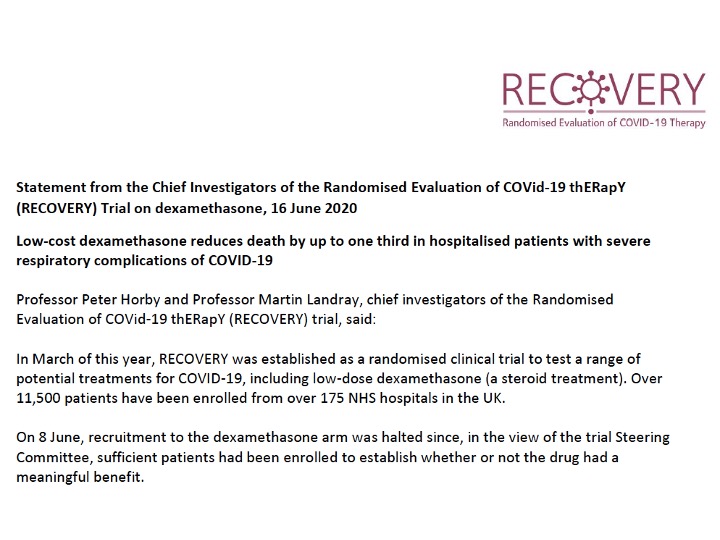There’s been a lot of noise in the last 24 hours about the #RECOVERY trial. @Oxford_NDPH @PeterHorby @MartinLandray @NIHRResearch @UKRI_News At a time when hope rules over facts and we’ve been disappointed more often than not, let’s break this down. Thread
First, the press release – this has been the new normal with releasing #COVID_19 trial results. Seems fair, when delaying till full paper published in a journal could be undesirable. Problems with previous such press releases have been spin & hype, not substantiated by data
I agree with others that we should wait for the full paper – especially the full results (protocol is already available). In #RECOVERY, 2104 patients with COVID_19 who received Dexamethasone were compared to 4321 patients who did not.
The press release states overall 17% reduction in mortality; 35% reduction in deaths for patients on ventilators and 20% reduction in deaths amongst those on oxygen alone. These results are great by themselves, but remember...
These are relative reductions in mortality. Absolute mortality reduction is from 40% to 28% (12%) amongst those ventilated, and 25% to 20% (5%) amongst those on oxygen. Still, very impressive. These differences are statistically significant but more importantly…
These are clinically significant results. Number needed to treat (NNT) is 8 (for those ventilated) and 20 (for those on oxygen). These are great, considering Dexa is a known drug, side-effects at this dose are not too bad, and most importantly, inexpensive & readily available.
There are limitations to what we know – first, the full paper is not yet out. Dexa is not useful for those with mild symptoms, nor those not getting hospitalized. Most importantly, this data does not support use as prophylaxis. So, if you’re not COVID19 positive, don’t take Dexa!
The #RECOVERY study also shows what good academic research (175 hospitals, an academic research network) can achieve. Randomized study design, pragmatic eligibility criteria, clear, objective end-points. Kudos to the researchers, to @Oxford_NDPH, @NIHRResearch & @UKRI_News

 Read on Twitter
Read on Twitter



